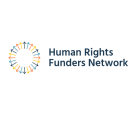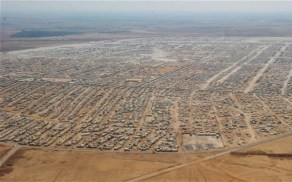This article originally appeared on the IHRFG‘s blog, on 1 December 2016. The original article can be found here.
Driving up to the Zataari refugee camp is overwhelming. The massive size of the camp is visible from afar, with a wide expanse of prefabricated homes, or informal tented settlements, lined up along the side of the road.
Upon entering the camp and seeing the blueprint broken down into districts, complete with schools, hospitals, grocery stores, and other infrastructure, the reality of the isolated, densely packed, recreated world becomes clear.
Inhabitants of the camp are stymied by their limited rights and freedomswithin their host country, leaving them incapable of rebuilding their lives. Discussions in the camp with representatives of the UN Refugee Agency (UNHCR) and ARDD – Legal Aid revealed the diverse needs of the refugee population, which span far beyond resettlement.
Daily protection, employment opportunities, health care, schooling, and access to courts for domestic issues, are just some of the needs that are barely being met at the most basic level.
Speaking with local NGOs serving the refugee community added to the list of needs, demonstrating the various ways in which we, as human rights funders, can engage in bettering the protection and everyday lives of an enormous and growing refugee population.
Discussing the ongoing outpouring of Syrian refugees, the limited options available to them, and the myriad obstacles they face illustrated the numerous challenges refugees are up against every step of the way. As funders, there are many entry points where we can provide support and facilitate projects that could vastly improve conditions for refugees.
When working with limited funds, the guiding question always centers on impact. In terms of the current refugee crisis, how can we allocate our funds in the most impactful way possible?
Do we support immediate relief and protection work to ease the journey for refugees as they flee violence and destruction in their home countries? Do we work to increase protection in places refugees are being held temporarily until they can be resettled? Do we invest in tolerance mechanisms to ease resettlement, minimize xenophobia, and promote full integration?
Perhaps the easiest answer to all of these questions, as bolstered by the Learning Visit, is that no one entity can resolve all of these issues.
Only through coordination and collaboration can funders collectively ensure that we are meeting the varied needs of refugees in the most effective and holistic ways possible.
Unfortunately, threats against Jordanian civil society and restrictions on refugees forming their own civil society organizations, present a serious obstacle to addressing these needs. A new mechanism for receiving foreign funding was introduced on October 18, the first day of our Learning Visit, and stipulates that NGOs and non-profit companies must receive prior permission from the Ministry of Planning and International Cooperation to receive foreign donations.
These new restrictions have been bolstered by a series of discussion papers issued by King Abdulah II ibn Al Hussein, and continue to limit the scope and capacity of critical civil society organizations, particularly those with programs related to the Jordan Response Platform to the Syria Crisis and the country’s own national and development goals.
The disabling environment for civil society is a global issue, but solutions must be developed and supported locally. Seeing the erosion of civic space is particularly troubling given that, prior to the Syrian refugee influx, relationships between the Jordanian government and civil society had been strengthened.
As Adam Coogle, a Middle East Researcher for Human Rights Watch mentioned during the opening plenary session, civil society organizations in Jordan had successfully built on the momentum from the Arab Spring to pressure the Jordanian government to implement policy reforms in support of human rights.
On the same panel, Ahmad Awad, the Director of Phoenix Center for Economic and Informatics Studies, also discussed the shrinking space for civil society in Jordan, specifically mentioning the growing influence of “wasta” – roughly translated to patronage networks – and how this trend has impacted human rights in the country.
Learning more about the intricacies of the Jordanian government’s crackdown on civil society reinforced the need to provide not only protection and support for refugees, but to couple that support with assistance for host countries in order to strengthen local communities and enable them to provide direct support to refugees.
Now, as I turn back to my work, I invite other organizations interested in discussing how we can coordinate our support so that we may all contribute, in accordance with our respective mandates, to improving the lives and promoting the rights of migrants, refugees, and host and resettlement communities.
Contributed by Shoshana Smolen, Advocacy and Editorial Officer at The Jacob Blaustein Institute for the Advancement of Human Rights.
View IHRFG and Ariadne’s Key Takeaways document, which addresses the context for the 2016 Learning Visit, human rights and funding challenges in Jordan, and a list of practical recommendations for funders working on the refugee crisis, both in the Jordanian context and more broadly.




Comments (0)